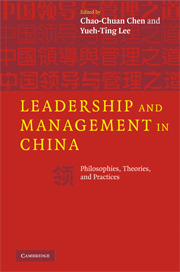Book contents
- Frontmatter
- Contents
- List of figures
- List of tables
- List of contributors
- Preface
- Acknowledgments
- Introduction: The diversity and dynamism of Chinese philosophies on leadership
- Part I The Confucian foundations
- Part II Alternative traditional Chinese leadership philosophies
- Part III Modern Chinese leadership theories and practices
- Index
Preface
Published online by Cambridge University Press: 14 May 2010
- Frontmatter
- Contents
- List of figures
- List of tables
- List of contributors
- Preface
- Acknowledgments
- Introduction: The diversity and dynamism of Chinese philosophies on leadership
- Part I The Confucian foundations
- Part II Alternative traditional Chinese leadership philosophies
- Part III Modern Chinese leadership theories and practices
- Index
Summary
This is the first book to our knowledge that introduces, explains, and theorizes on Chinese leadership philosophies and practices. The contributors include well-established mainland and overseas Chinese leadership and management scholars such as Larry Farh from the Hong Kong University of Science and Technology and Kwang-kuo Hwang from the National Taiwan University. The Chinese authors were joined by Western scholars including George Graen, renowned for his Leader–Member Exchange Theory and his cross-cultural leadership research and consulting.
At a time when China is becoming more central in a globalizing world economy, business managers as well as scholars from outside China increasingly feel the importance of understanding the thoughts and views of Chinese leadership and management. As one of the oldest civilizations in the world, and with the largest population, China has produced internationally known statesmen, philosophers, thinkers, and leaders; yet, among the vast volume of literature on leadership within and outside China, we see so little on Chinese leadership, and by Chinese scholars. This book represents a significant step toward filling a serious gap in the teaching, research, and practice of leadership and management.
The book has three parts. It begins with Confucian philosophical foundations of leadership theory and practice in Ancient China (Part I). Part II presents alternative ancient philosophical approaches to leadership, such as Daoism, Legalism, and the Art of war. Part III consists of modern and contemporary Chinese leadership theories and practices such as paternalistic leadership, Mao's revolutionary theory and practice, and Deng's theory and practice of economic reform.
- Type
- Chapter
- Information
- Leadership and Management in ChinaPhilosophies, Theories, and Practices, pp. xv - xviPublisher: Cambridge University PressPrint publication year: 2008

